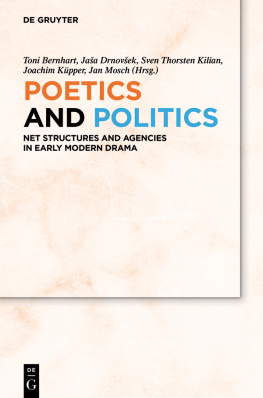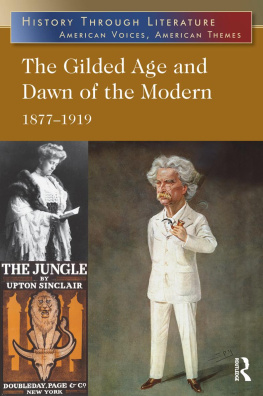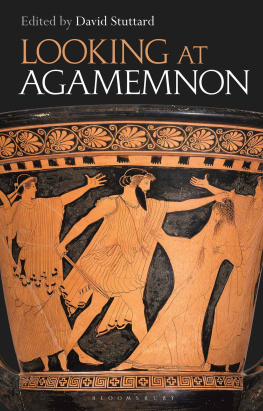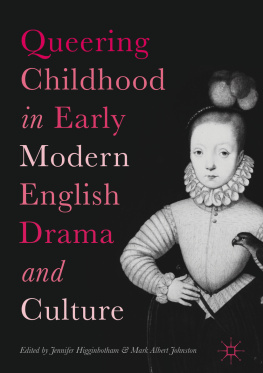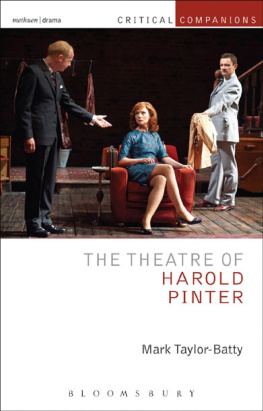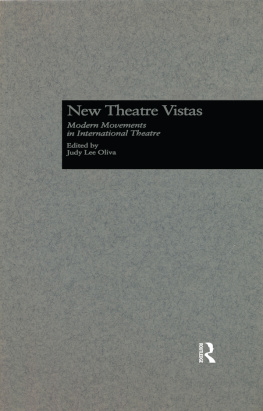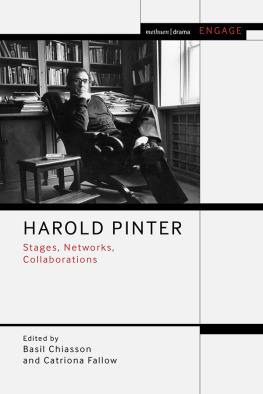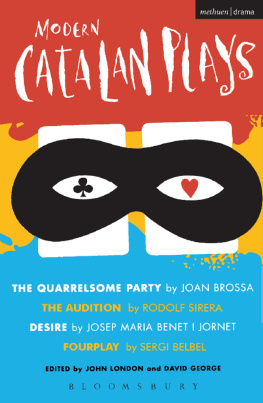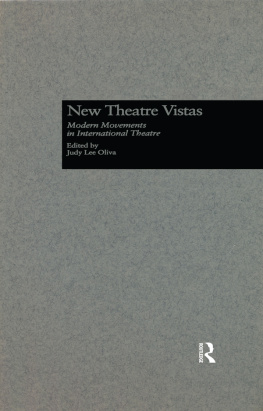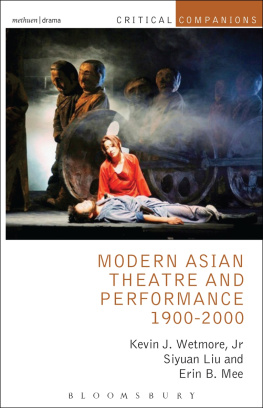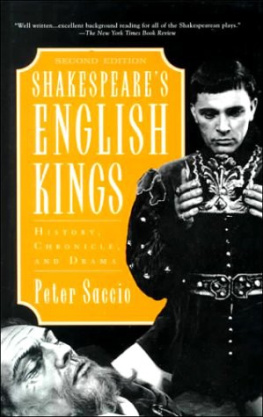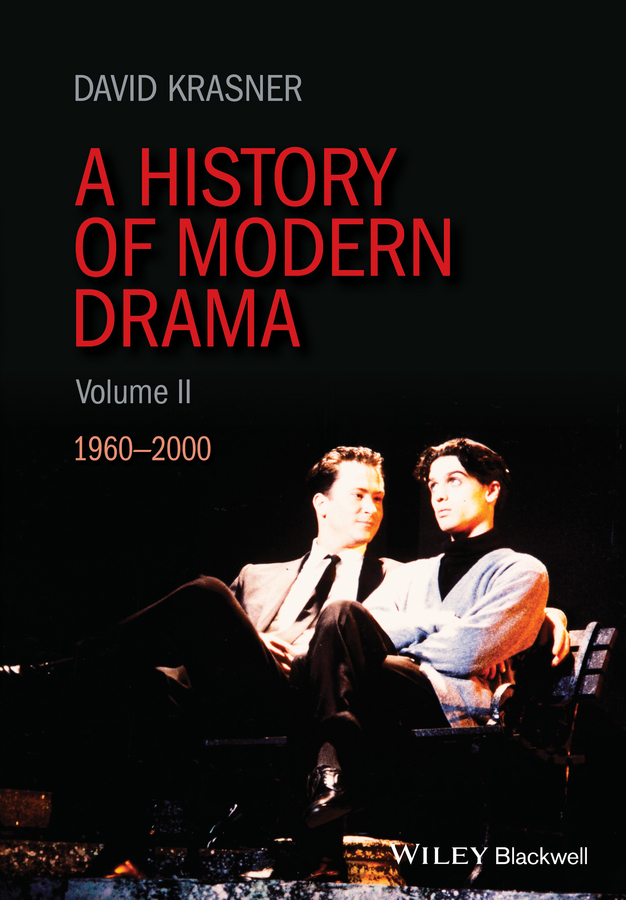
Table of Contents
Guide
Pages
Books by David Krasner
- A History of Modern Drama, Volume 1 (2012)
- An Actors Craft: The Art and Technique of Acting (2012)
- Theatre in Theory: An Anthology (editor, 2008)
- American Drama, 19452000: An Introduction (2006)
- Staging Philosophy: New Approaches to Theater, Performance, and Philosophy (coeditor with David Saltz, 2006)
- A Companion to Twentieth-Century American Drama (editor, 2005)
- A Beautiful Pageant: African American Theatre, Drama, and Performance, 19101927 (2002), 2002 Finalist for the Theatre Library Associations George Freedley Memorial Award
- African American Performance and Theater History: A Critical Reader (coeditor with Harry Elam, 2001), Recipient of the 2002 Errol Hill Award from the American Society for Theatre Research (ASTR)
- Method Acting Reconsidered: Theory, Practice, Future (editor, 2000)
- Resistance, Parody, and Double Consciousness in African American Theatre, 18951910 (1997), Recipient of the 1998 Errol Hill Award from ASTR
See more descriptions at www.davidkrasner.com
A History of Modern Drama
Volume II
19602000
David Krasner
This edition first published 2016
2016 David Krasner
Registered Office
John Wiley & Sons, Ltd, The Atrium, Southern Gate, Chichester, West Sussex, PO19 8SQ, UK
Editorial Offices
350 Main Street, Malden, MA 02148-5020, USA
9600 Garsington Road, Oxford, OX4 2DQ, UK
The Atrium, Southern Gate, Chichester, West Sussex, PO19 8SQ, UK
For details of our global editorial offices, for customer services, and for information about how to apply for permission to reuse the copyright material in this book please see our website at www.wiley.com/wiley-blackwell.
The right of David Krasner to be identified as the author of this work has been asserted in accordance with the UK Copyright, Designs and Patents Act 1988.
All rights reserved. No part of this publication may be reproduced, stored in a retrieval system, or transmitted, in any form or by any means, electronic, mechanical, photocopying, recording or otherwise, except as permitted by the UK Copyright, Designs and Patents Act 1988, without the prior permission of the publisher.
Wiley also publishes its books in a variety of electronic formats. Some content that appears in print may not be available in electronic books.
Designations used by companies to distinguish their products are often claimed as trademarks. All brand names and product names used in this book are trade names, service marks, trademarks or registered trademarks of their respective owners. The publisher is not associated with any product or vendor mentioned in this book.
Limit of Liability/Disclaimer of Warranty: While the publisher and David Krasner have used their best efforts in preparing this book, they make no representations or warranties with respect to the accuracy or completeness of the contents of this book and specifically disclaim any implied warranties of merchantability or fitness for a particular purpose. It is sold on the understanding that the publisher is not engaged in rendering professional services and neither the publisher nor the author shall be liable for damages arising herefrom. If professional advice or other expert assistance is required, the services of a competent professional should be sought.
Library of Congress Cataloging-in-Publication Data applied for
9781405157582 [hardback]
A catalogue record for this book is available from the British Library.
Cover image: A production of Angels in America, 1996, directed by David Krasner, and photo by the designer, Patrick Immel. Thom Miller as Louis, Justin DeGiacimo as Prior.
For Emma Bennett
Preface and Acknowledgments
Men make their own history, but they do not make it just as they please; they do not make it under circumstances chosen by themselves, but under circumstances directly encountered, given and transmitted from the past. The tradition of all the dead generations weighs like a nightmare on the brain of the living.
Karl Marx
Theatre is the vanishing life of a collective contemporaneity of truths.
Alain Badiou
A people makes a poem, a poem makes a people.
Jacques Rancire
A History of Modern Drama, Volume II, picks up where Volume I leaves off, providing an analysis of selected dramas and dramatists from 1960 through 2000. My aim is to trace methodologies of modern drama during this period, an era marked, as Rodney Simard observes, by Harold Pinter and Edward Albee among the first generation of postmoderns, accepting the laurel of Beckett, the last of the moderns. Likewise, I begin with Harold Pinter, who receives the arbitrary but significant mantel from Beckett as the first postmodernist, and end with Sarah Kane. There is symmetry to this arrangement: Pinter begins this volume because he dovetails with Samuel Beckett who concluded Volume I; analyzing Kane is an appropriate end because her innovative and compelling dramas written during the late 1990s bring to a close a modernist/postmodernist movement that, I shall argue, started around 1960. She is, moreover, a link to Georg Bchner, the playwright who began Volume I and whose plays were, serendipitously, directed by Sarah Kane. Bchner and Kane serve, in many regards, as bookends to this two-volume history of modern drama.
This book is intended for three audiences simultaneously: for the general or undergraduate reader who has some background in the subject and wants to increase their awareness of modern dramas capacious themes and ideas; for graduate students and scholars interested in historiography, dramaturgy, and larger social contexts, issues, and philosophies perspectives that fall under the rubric of modern drama; and for practitioners who wish to consider my particular viewpoint in order to prepare for productions and performances. My objective is to examine the perspectives of the era, to provide close readings of the plays of this period by selecting representative dramas that stand in for others, and to tie themes together. With this in mind, my purpose in analyzing modern drama is not to examine all of the plays written during this period, still less to propose an all-consuming critical reading of the subject. The content of modern drama from 1960 to 2000 is, like Volume I, enormous, discontinuous, and non-teleological. A book many times this size could hardly provide a full account, owing to the diversity, range, and sweep of modern drama throughout the globe. What was once a modernism containing sizable yet relatively manageable contributing dramas and dramatists is now an increasingly unwieldy and turgid condition, encompassing playwrights from multiple nations, ethnicities, and regions. Volume I enjoyed the advantage of plays that have gained recognition, what Pierre Bourdieu calls the accumulation of symbolic capital, consisting in making a name for oneself, a known, recognized name, a capital of consecration implying a power to consecrate objects (with a trademark signature) or persons (through publication, exhibition, etc.) and therefore to give value. By contrast, the plays in this volume, relatively new, have yet to prove by and large their sustainability and symbolic capital. Furthermore, modernism itself becomes increasingly dispersed when detached from a solely Anglo-European realm; I intend to examine both Western and non-Western dramas. Finally, dramatists during this 40-year period were more individualistic; while they drew on the foundations of their predecessors, playwrights experimented in ways that dispersed the meaning, form, and content of modern drama. Discerning a comprehensive analysis of modern drama circa 1960 to 2000 isnt a simplistic collation of multiple plays and playwrights; rather, this study should be grasped as a whole with parts and fragments feeding into various meanings and ideas some in agreement and others contradicting previous meanings of modern drama.
Next page

